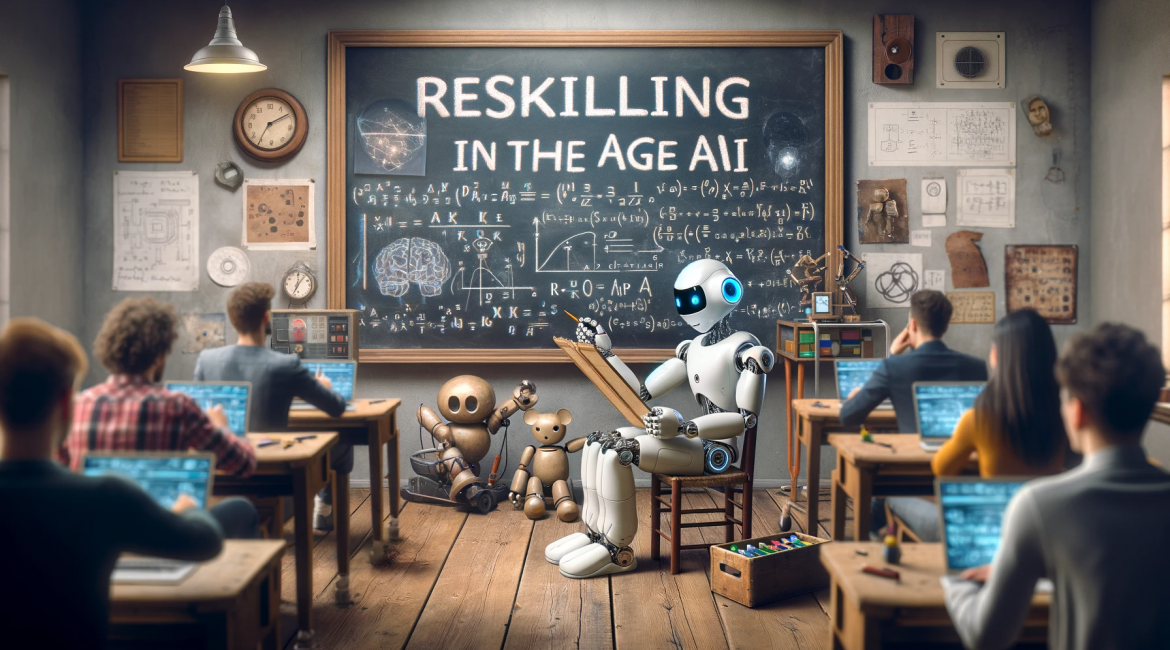As we sail into the uncharted waters of the AI era, the notion of a “job for life” is fast becoming a relic of the past. The singularity, a term popularized by futurist Ray Kurzweil, predicts a future where artificial intelligence will surpass human cognitive abilities, potentially leading to profound societal change. This seismic shift ushers in not just challenges but also a cascade of opportunities for personal and professional growth. The ‘Singularity Survival Guide: Reskilling in the Age of AI’ is your compass in navigating these turbulent but exciting times.
The guide isn’t a collection of buzzwords or bullet points; it’s a map to a future where your value in the workforce isn’t tied to the job you perform today but to the skills you’re willing to acquire tomorrow. As AI reshapes industries, the onus is on us to adapt, evolve, and embrace lifelong learning.
Reskilling in the age of AI isn’t just about learning to code or understanding the inner workings of machine learning algorithms. It’s about cultivating a mindset open to continuous learning, critical thinking, and creativity. It’s about understanding the essence of AI’s potential impact and harnessing it to complement and augment our unique human capabilities.
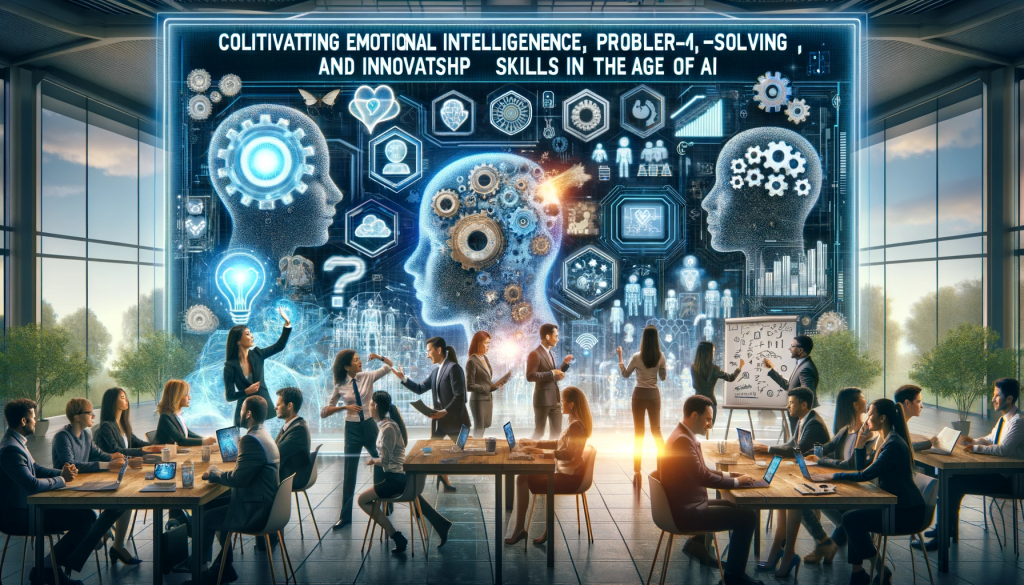
So, what does reskilling look like in this new age?
Firstly, it’s important to identify the skills that AI is unlikely to replicate fully in the near future. Emotional intelligence, problem-solving, leadership, and the ability to innovate are areas where humans have the edge. Cultivating these skills can make you indispensable in an AI-augmented workplace.
In the rapidly evolving landscape of Artificial Intelligence (AI), certain human skills remain uniquely valuable and are unlikely to be fully replicated by machines in the foreseeable future. As we delve deeper into this realm, let’s explore the critical skills that will keep you indispensable in an AI-augmented workplace. This exploration is not just about identifying these skills; it’s about understanding why they are irreplaceable and how to hone them effectively.
Emotional Intelligence (EI):
Emotional intelligence is the ability to perceive, evaluate, and respond to your own emotions and the emotions of others. AI, despite its advances, struggles to fully grasp the nuances of human emotions, which are complex and often non-linear. To develop EI, focus on enhancing empathy, active listening, and effective communication. This can be achieved through mindfulness practices, engaging in diverse social interactions, and developing a deeper understanding of different cultural and emotional contexts. In the workplace, EI plays a crucial role in team collaboration, conflict resolution, and fostering an inclusive environment. It’s about understanding not just the ‘what’ but the ‘why’ behind people’s actions and reactions.
Problem-Solving:
AI can process data and provide solutions based on algorithms, but human problem-solving encompasses more than just data analysis. It involves creativity, intuition, and the ability to navigate ambiguity. Enhancing your problem-solving skills can involve engaging in complex projects that require lateral thinking, learning from diverse fields to bring in new perspectives, and practicing scenario-based planning. Critical thinking exercises, brainstorming sessions, and strategic games like chess can also sharpen your problem-solving skills.
Leadership:
Effective leadership is about inspiring and guiding teams towards a common goal. It involves vision, motivation, and most importantly, the ability to adapt to change. AI may assist in decision-making through data analysis, but it lacks the capacity to inspire and motivate a team. Developing leadership skills can involve mentorship, where you learn from experienced leaders, and taking on leadership roles, even in small projects, to understand the dynamics of guiding a team. Leadership workshops, reading biographies of successful leaders, and self-reflection on your leadership style can also be beneficial.
Innovation:
Innovation is inherently human – it’s about connecting dots in ways that haven’t been connected before. While AI can generate ideas based on existing data, true innovation often comes from a deep understanding of unmet needs and thinking outside the box. To cultivate innovation, immerse yourself in environments that challenge the status quo. This might mean joining creative think tanks, participating in innovation workshops, or simply dedicating time to brainstorming and daydreaming. Exposure to diverse industries, cultures, and disciplines can also fuel innovative thinking.
Developing these skills:
While identifying these skills is the first step, developing them requires a strategic and consistent approach. This could involve setting specific goals for skill enhancement, seeking feedback, and continuously challenging yourself to step out of your comfort zone. For instance, you could aim to lead a challenging project at work, commit to reading books on emotional intelligence, or attend a workshop on creative problem-solving.
In an AI-augmented workplace, these human-centric skills will become your competitive edge. They are the skills that make you more than just a worker; they make you a visionary, a leader, and a key player in the human-machine collaboration that is shaping the future. By investing in these skills, you’re not just preparing for the future; you’re actively shaping it in a way that leverages the best of both human and artificial intelligence.
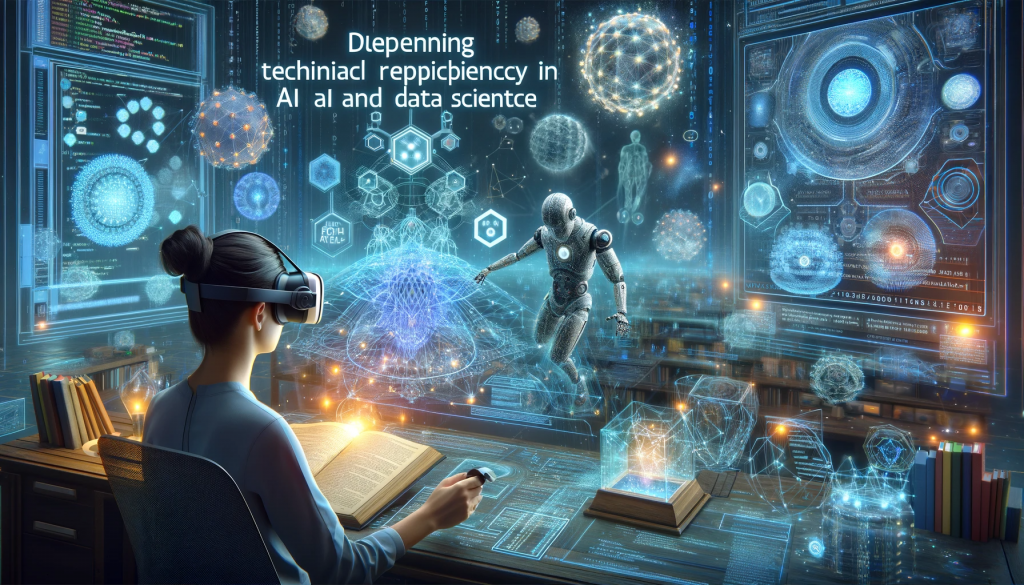
Part 2
The second key area in the “Singularity Survival Guide” is technical proficiency. In an era increasingly dominated by AI and machine learning, possessing a foundational understanding of these technologies is not just an advantage; it’s a necessity. This proficiency enables effective communication with technical teams and empowers you to make informed decisions that intertwine with AI applications.
Building a Foundation in AI:
Start by learning the basics of AI and machine learning. This doesn’t mean you need to become an expert coder overnight but understanding the principles, potential, and limitations of AI will help you grasp how it can be applied in your field. There are numerous online courses, workshops, and seminars available that can introduce you to the world of AI. Websites like Coursera, edX, and Udemy offer courses designed for beginners, covering topics like AI fundamentals, machine learning, and ethical considerations in AI.
Effective Communication with Technical Teams:
Once you have a basic understanding of AI, you’ll find it easier to communicate with specialists. You’ll be able to ask the right questions, understand the answers, and contribute meaningfully to discussions around AI implementation. This knowledge is invaluable in roles that require liaising between technical and non-technical teams.
Making Informed Decisions:
With a foundational understanding of AI, you can better assess how AI tools and applications can be integrated into your work or business strategy. You’ll be able to evaluate AI products and services more critically and understand the implications of integrating AI into your processes.
Diving Deeper into Data Science and AI Development:
For those who find a passion in the technical aspects of AI, delving deeper into data science and AI development can open new career opportunities. This could involve learning programming languages such as Python or R, which are widely used in data science and AI. You might also explore specialized areas like neural networks, natural language processing, or robotics.
Practical Application and Experimentation:
Hands-on experience is one of the best ways to deepen your technical proficiency. Participating in hackathons, contributing to open-source AI projects, or even experimenting with AI tools in your current role can provide practical insights and skills.
Career Opportunities:
Proficiency in AI and data science can lead to various exciting career paths. Roles like data analyst, AI product manager, or machine learning engineer are in high demand. Even in non-technical roles, AI proficiency can give you an edge, making you an invaluable asset in strategic planning, product development, or marketing.
Continuous Learning:
The field of AI is constantly evolving. Staying updated with the latest trends, breakthroughs, and ethical considerations is crucial. Subscribing to relevant journals, attending industry conferences, and being part of professional networks can keep you informed and connected.
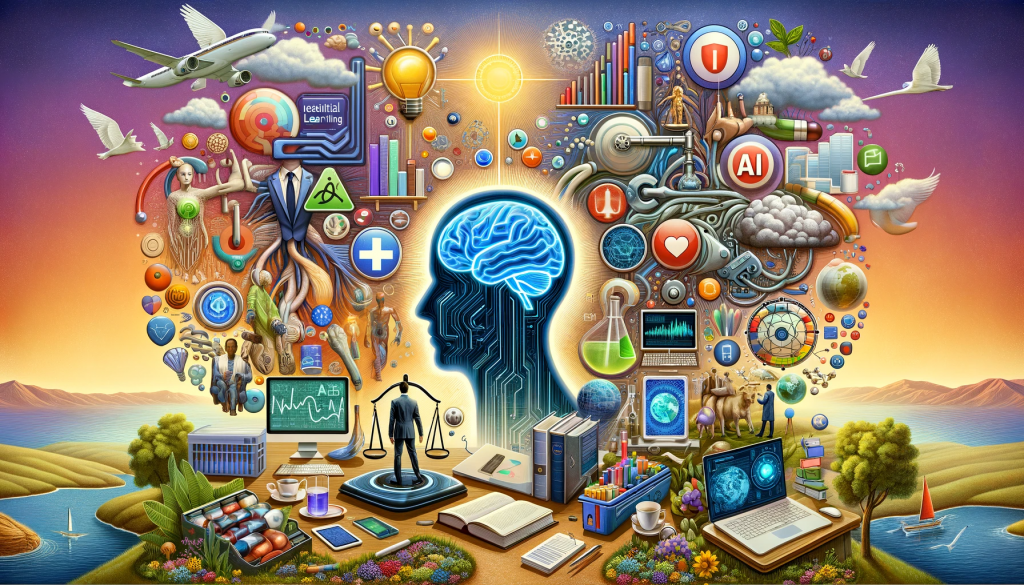
Part 3
Thirdly, interdisciplinary learning is key. The future belongs to those who can bridge the gap between AI and other fields such as ethics, law, healthcare, and environmental science. Understanding the ethical implications of AI, its societal impact, and how it can be leveraged for sustainable development can position you as a thought leader in a post-singularity world.
Interdisciplinary learning in AI is akin to embarking on an exploration where technology meets the vast expanse of human knowledge and endeavor. This journey transcends the binary world of code, venturing into territories where AI not only coexists but also collaborates with various disciplines to create something greater than the sum of its parts.
AI and Ethics: Navigating the Moral Maze
Ethics in AI is not just about preventing machines from making harmful decisions; it’s about steering the very course of technological evolution in a direction that aligns with human values. This involves grappling with philosophical questions that have intrigued humanity for centuries, now seen through the lens of AI. It’s about answering questions like, “Can machines learn to understand human values?” or “How do we encode empathy and fairness in algorithms?”
AI in Law: The New Legal Frontiers
The intersection of AI and law opens up a new frontier of legal challenges and opportunities. Here, you’re not just learning about regulations; you’re part of a pioneering movement redefining legal boundaries. This could involve exploring how AI can aid in legal research, the implications of AI in criminal justice, or the emerging field of AI rights and personhood.
Healthcare and AI: Pioneering Life-Saving Innovations
Merging AI with healthcare goes beyond data analysis and pattern recognition. It’s about being at the forefront of life-saving innovations. Here, you could be part of groundbreaking research using AI for early disease detection, personalized treatment plans, or even in the development of intelligent prosthetics that learn and adapt to their user’s needs.
Environmental Science Meets AI: Saving the Planet with Algorithms
In environmental science, AI is a powerful ally in the fight against climate change and ecological degradation. This interdisciplinary endeavor could see you working on projects like using AI to monitor and protect endangered species, optimize renewable energy systems, or develop models to predict and mitigate natural disasters.
The Educational Adventure: Learning Through Diverse Lenses
Educating yourself in this interdisciplinary world is an adventure in itself. It’s about immersing yourself in varied learning environments – from online courses on AI and ethics to workshops in AI for environmental conservation. Each learning experience is a piece of the puzzle, contributing to a holistic understanding of AI’s role in our world.
Networking: Creating a Mosaic of Perspectives
Networking in this field means building connections not just within tech circles but with philosophers, legal experts, healthcare professionals, and environmentalists. Each interaction is an opportunity to view AI through a different lens, enriching your understanding and approach to technology.
Innovative Application: Making a Tangible Impact
Interdisciplinary learning in AI is ultimately about applying this knowledge to make a tangible impact. Whether it’s developing an AI-powered legal advisory system, an AI-driven diagnostic tool, or a climate change simulation model, your work lies at the intersection of technology and human progress.
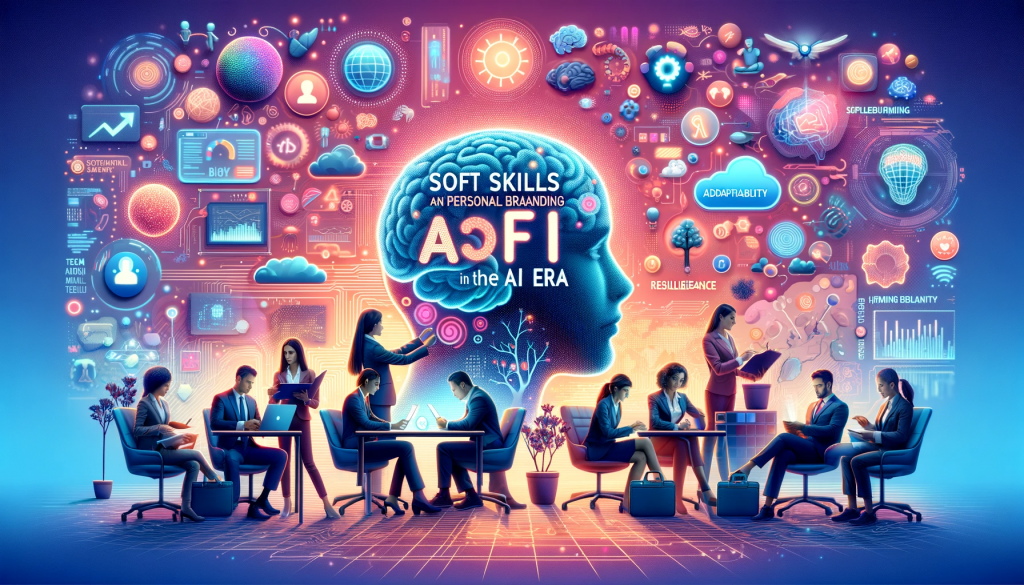
Part 4
In the fourth installment of our “Singularity Survival Guide”, we delve into the realm of soft skills and personal branding in an AI-dominated world. As automation becomes more prevalent, the value of human-centric skills such as adaptability, resilience, and collaboration is skyrocketing. These are the skills that AI, for all its computational prowess, cannot replicate. They are the essence of what makes us uniquely human and will become our superpowers in the workplace of the future.
Adaptability: The Art of Embracing Change
In an AI-driven world, change is the only constant. Adaptability is about being flexible and open to new ways of working and thinking. It’s about thriving in uncertainty and turning challenges into opportunities. Cultivating adaptability involves stepping out of your comfort zone, being open to new ideas, and being willing to learn and unlearn. It’s about viewing AI not as a threat, but as a tool that opens new doors.
Resilience: The Power of Perseverance
As AI transforms industries, resilience will be key to navigating this new landscape. It’s about having the mental toughness to face setbacks and failures, learning from them, and moving forward. Building resilience can involve practicing mindfulness, seeking support networks, and maintaining a positive outlook. In an AI-augmented workplace, resilience means staying focused on your goals, even as the world around you evolves rapidly.
Collaboration: The Magic of Diverse Teams
AI might be able to analyze data at unprecedented speeds, but it can’t replicate the creative synergy that happens when diverse minds come together. The ability to collaborate effectively with people from different backgrounds and disciplines will be invaluable. Enhancing this skill involves active listening, empathy, and effective communication. It’s about building bridges, finding common ground, and creating solutions that are greater than the sum of their parts.
Personal Branding: Crafting Your Unique Narrative
In a sea of digital profiles and AI-analyzed resumes, personal branding becomes crucial. It’s about telling your story in a way that resonates and stands out. Your personal brand should reflect your unique blend of skills, experiences, and perspectives. It’s about showcasing how you can add value in ways that AI cannot – your creativity, your emotional intelligence, and your ability to navigate complex ethical landscapes. Whether it’s through a personal website, social media presence, or networking, your personal brand should articulate your unique contribution in an AI-driven world.
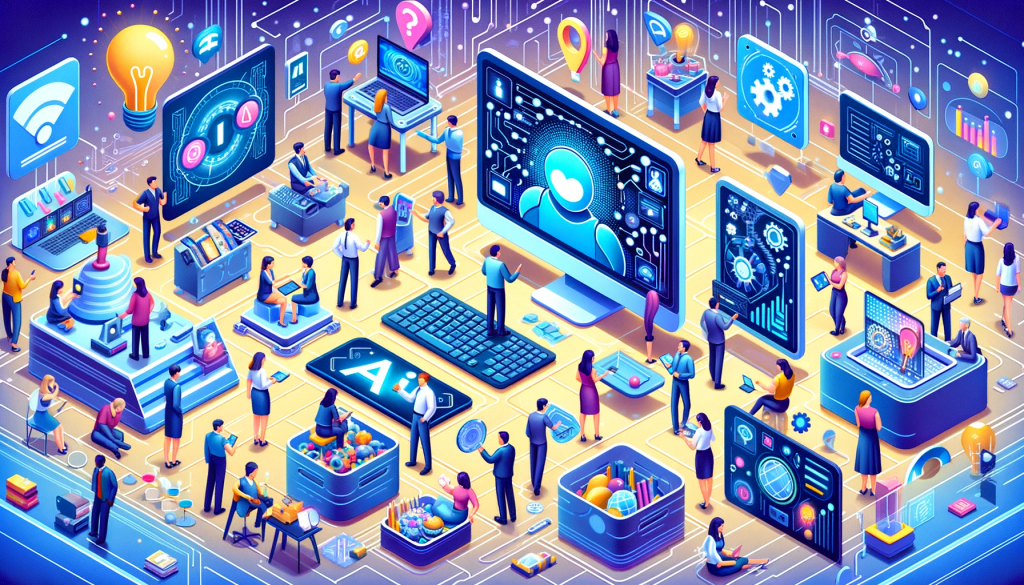
Part 5
As we dive into the fifth facet of our “Singularity Survival Guide”, we focus on the significance of being tech-savvy in an age increasingly influenced by AI. This crucial aspect is not about becoming an AI expert but about gaining a fundamental grasp of AI technologies – understanding their capabilities, limitations, and language. This knowledge empowers you to work effectively with AI tools and platforms and ensures you are a contributing voice in the evolving dialogue around AI.
Understanding AI Technologies: More Than Just Buzzwords
In a world where terms like machine learning, neural networks, and natural language processing are becoming commonplace, understanding what they mean and how they function is vital. This knowledge demystifies AI and allows you to see it as a tool rather than an enigma. You can start with online courses or webinars that explain these concepts in layman’s terms, providing a foundation without overwhelming technicalities.
Recognizing Capabilities and Limitations: The Balanced View
Knowing what AI can and cannot do is crucial in setting realistic expectations and understanding how it can be applied effectively in your field. For instance, while AI can process and analyze large datasets efficiently, it may not be as effective in tasks that require emotional understanding or creative thinking. Understanding these boundaries helps in strategizing how AI can be integrated into your work processes.
Speaking the Language of AI: Inclusive Communication
Being tech-savvy also means being able to speak the language of AI. This doesn’t require coding skills; rather, it’s about understanding AI terminology well enough to communicate effectively with technical teams. It’s about asking the right questions and being able to interpret the answers, ensuring that AI implementations align with the broader goals of your project or organization.
Staying Updated: Riding the Wave of Technological Advancements
The field of AI is rapidly evolving, and staying updated is crucial. Follow tech blogs, subscribe to AI-focused publications, or join tech forums. This continuous learning helps you stay abreast of the latest advancements and understand how they might impact or benefit your work.
Practical Application: AI in Everyday Work
Applying your AI knowledge doesn’t necessarily mean executing complex AI projects. It could be as simple as using AI-driven tools for data analysis, customer relationship management, or market research. The aim is to familiarize yourself with how AI operates in practical scenarios, which can significantly enhance your productivity and efficiency.
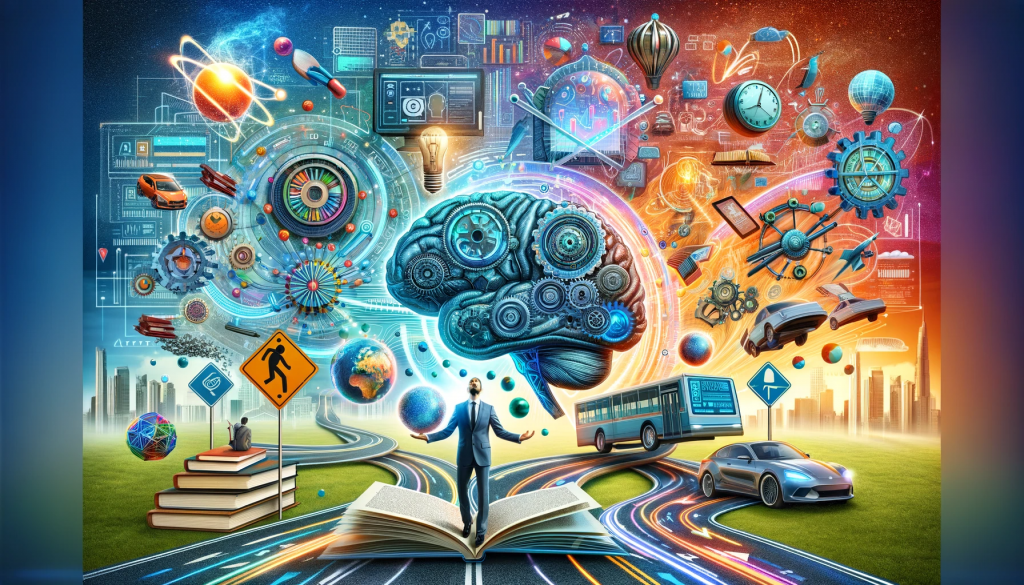
Part 6
Sixthly, flexibility and lifelong learning are key. The careers of the future will likely involve multiple roles, some of which don’t even exist yet. Staying curious, continuously upskilling, and being open to change will be critical for long-term career success in an AI-driven world.
As we edge closer to the singularity, a term coined by futurist Ray Kurzweil to describe the point where AI surpasses human intelligence, the concept of a fixed career path becomes increasingly outdated. The AI era beckons a new paradigm of professional development, one that emphasizes flexibility, continuous learning, and the ability to adapt to an ever-changing technological landscape.
Flexibility: The New Professional Currency
Flexibility in the AI era goes beyond merely adjusting to new software or workflows. It encompasses a willingness to pivot across different roles, some of which may be emerging or evolving. This agility becomes vital as AI reshapes job functions and creates new opportunities. Professionals who can move fluidly between roles, adapting their skills to fit new contexts, will thrive in this dynamic environment.
Lifelong Learning: A Continuous Journey
The concept of lifelong learning is not new, but in the context of AI, it gains a heightened significance. Continuous upskilling becomes not just beneficial but essential. This doesn’t mean constant formal education but rather an ongoing commitment to staying abreast of new technologies, methodologies, and industry trends. It’s about maintaining a state of perpetual curiosity and willingness to learn, whether through online courses, workshops, networking, or self-directed study.
Multiple Career Paths: The New Norm
In the future, having multiple careers might become the norm rather than the exception. Professionals may find themselves transitioning between different industries or job roles as AI opens up new avenues. This could mean an engineer today might become a data analyst tomorrow, and later a sustainability consultant, each role leveraging different aspects of their skillset and experience.
Embracing Change: A Key to Success
Adapting to the AI era requires a mindset that embraces change rather than resists it. This involves being open to new ways of working, thinking, and collaborating. As AI takes on more routine tasks, professionals can focus on areas where human creativity and insight are paramount. Embracing change also means being proactive about personal and professional growth, seeking out opportunities for development, and staying agile in the face of new challenges.

Part 7
In the seventh key aspect of the “Singularity Survival Guide: Reskilling in the Age of AI”, we emphasize the significance of networking and community engagement. As we navigate through the rapid currents of digital transformation, the power of human connections becomes increasingly vital. It’s not just about expanding your professional network; it’s about cultivating relationships that provide support, insights, and open doors to new opportunities.
Building Strong Human Connections in a Digital World:
In an era dominated by digital interfaces, personal relationships still hold immense value. Networking in the age of AI goes beyond traditional business card exchanges. It’s about creating meaningful connections that can withstand the test of time and technological change. This involves actively engaging in discussions, showing genuine interest in others’ work, and offering help where possible. It’s about building a community where knowledge, experiences, and opportunities are shared generously.
Engaging with Professional Communities:
Professional communities, especially those focused on AI and technology, are goldmines of information and resources. Joining these communities can provide insights into the latest trends, challenges, and innovations in AI. Platforms like LinkedIn groups, specialized online forums, or local meetup groups offer spaces to connect with like-minded professionals. Engaging in these communities isn’t just about taking; it’s also about contributing – sharing your knowledge, asking insightful questions, and even offering mentorship to those just starting their journey in AI.
Attending Seminars and Workshops:
Seminars and workshops offer more than just learning opportunities; they are avenues to meet experts, innovators, and peers in the field. These events often attract a diverse group of participants, from AI enthusiasts to seasoned professionals, providing a rich environment for networking. Attending these events with an open mind and a proactive approach to interaction can lead to collaborations, job opportunities, or even the spark of new ideas.
Participating in AI-focused Events and Discussions:
Engagement in AI-related events, such as hackathons, conferences, or panel discussions, is not only beneficial for staying updated on AI advancements but also for networking. These events often encourage collaboration and brainstorming, leading to a deeper understanding of AI’s societal implications. By participating actively, you position yourself as a curious and knowledgeable professional, opening up avenues for future collaborations and career advancements.
Broadening Your Understanding Through Diverse Interactions:
The realm of AI is vast and multidisciplinary. Engaging with professionals from different backgrounds – be it ethics, law, healthcare, or environmental science – can broaden your understanding of AI’s impact. These interactions can lead to a more holistic view of how AI is shaping our society and where you can fit into this evolving landscape.

Part 8
In the eighth chapter of our comprehensive guide, “The Singularity Survival Guide: Reskilling in the Age of AI,” we delve into the paramount importance of ethical considerations and social responsibility. As AI continues to transform industries and redefine our societal fabric, professionals must not only adapt to these changes but also actively shape the ethical landscape of this new era. This segment of the guide isn’t just about adapting to technological advancements; it’s about becoming a conscientious steward of AI, ensuring its responsible and equitable use.
Understanding Ethical Implications:
The Cornerstone of Responsible AI As AI technologies permeate various aspects of life, their ethical implications become increasingly significant. Understanding these implications is crucial, not just for AI practitioners but for all professionals. This understanding encompasses a broad range of issues, from data privacy and algorithmic bias to AI’s impact on employment and societal norms. It’s about grasping the potential consequences of AI deployments and being vigilant about unintended harm.
Ethical Training and Education:
Building a Foundation To navigate these ethical waters, education and training in AI ethics are essential. This can include formal courses, workshops, or self-directed learning focused on the ethical dimensions of AI. Such education should cover key topics like the principles of ethical AI design, methods for ensuring fairness in algorithms, and strategies for safeguarding privacy and security in AI systems.
Advocacy for Responsible AI:
A Professional Duty In an AI-driven world, advocating for responsible AI use becomes a professional duty. This involves more than just understanding ethical principles; it’s about actively promoting these principles in your workplace and industry. It can include participating in forums discussing AI ethics, contributing to policy discussions, or even helping to formulate ethical guidelines within your organization.
Staying Informed:
Keeping Pace with AI’s Societal Impact The field of AI is evolving rapidly, and with it, its societal implications. Staying informed about the latest developments, debates, and research in AI ethics is crucial. This continuous learning can be achieved through various channels, including academic journals, industry reports, and conferences focused on the societal aspects of AI.
Practical Application:
Ethical AI in Practice Understanding and advocating for ethical AI is not just theoretical; it should translate into practical applications. This can involve assessing AI projects for potential ethical risks, ensuring transparency in AI decision-making processes, and working towards inclusive and fair AI solutions. It’s about asking critical questions: Who could be affected by this AI system? Are there biases in the data? How transparent are the decision-making processes?
Networking for Change:
Collaborating for Ethical AI Building networks with like-minded professionals committed to ethical AI is invaluable. Such networks can provide support, share best practices, and collaborate on initiatives promoting responsible AI. They can be found in professional associations, online communities, and cross-industry groups focused on ethical technology.
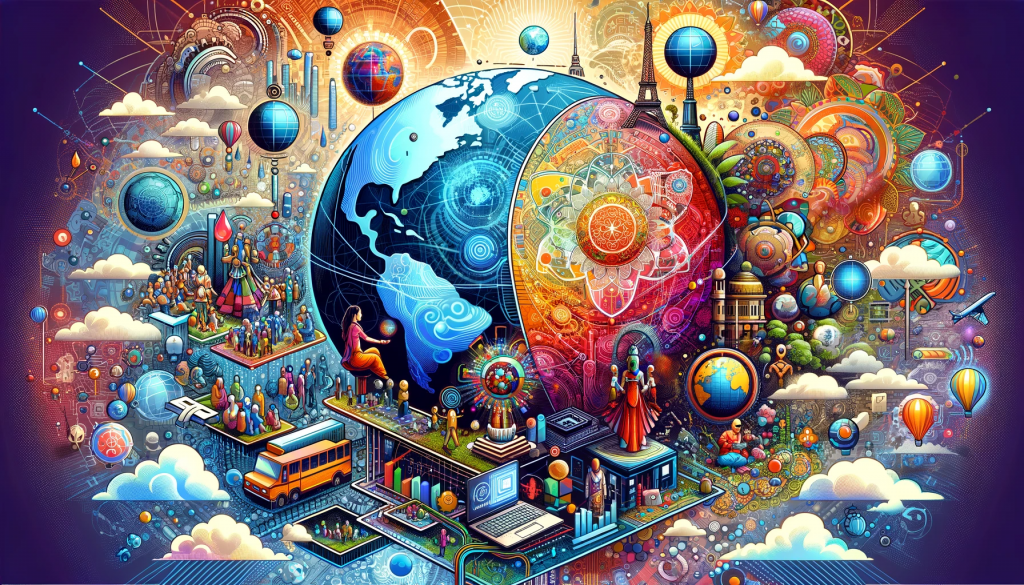
Part 9
In the ninth segment of the Singularity Survival Guide, we explore the crucial balance between global awareness and local action. As AI continues to reshape our world, understanding its global trends and trajectories is essential. However, the true mastery lies in applying this knowledge to address the unique needs and challenges of your local community or industry. This balance is not just a strategic approach; it’s a necessity for professionals looking to harness AI’s potential effectively.
Global Trends in AI:
The AI landscape is constantly evolving, with breakthroughs and innovations emerging from every corner of the globe. Staying informed about these developments is crucial. This could involve following international AI research, understanding how different countries are adopting and regulating AI, and observing global market trends. Such knowledge not only broadens your perspective but also enables you to anticipate and prepare for changes that may impact your field.
Local Application of Global AI Insights:
Understanding global AI trends is one thing, but applying these insights to your local context is where the real challenge lies. This means not just copying what works elsewhere, but adapting and modifying these solutions to fit local needs and conditions. For example, an AI healthcare solution developed in one country may need significant adjustments to be effective in another due to differences in healthcare systems, patient demographics, or disease prevalence.
Cultural Sensitivity and Local Relevance:
AI solutions must be culturally sensitive and locally relevant. This requires an understanding of local customs, languages, and societal norms. Involvement in local AI projects, community groups, and industry associations can provide valuable insights into what’s needed and what might work. It also offers opportunities to test and refine AI solutions in a local context.
Leveraging AI for Local Challenges:
Every community and industry faces its own set of challenges. Whether it’s improving local healthcare, enhancing education systems, or optimizing small business operations, AI can play a pivotal role. By identifying these local challenges and thinking creatively about how AI can help solve them, you can position yourself as a problem-solver and innovator in your community.
Networking and Collaboration:
Building a network of local AI professionals, educators, and enthusiasts can facilitate the exchange of ideas and experiences. Collaborating with local universities, tech incubators, and industry groups can foster a vibrant AI ecosystem that’s responsive to local needs.
The Global-Local Nexus:
Finally, the ability to link global AI developments with local initiatives can make you an invaluable resource. It’s about translating the big picture into actionable local strategies, ensuring that AI solutions are not only innovative but also grounded in reality.

The Future
As we venture towards the horizon of the post-singularity era, a time where artificial intelligence (AI) intertwines intricately with every aspect of our lives, embracing the unknown becomes a vital skill. The singularity, a concept once nestled in the realms of science fiction, is fast becoming a tangible reality, bringing with it a mix of excitement, opportunity, and a fair share of uncertainty.
Embrace the Uncertainty
A Call to Adventure The future post-singularity is akin to an uncharted ocean – vast, mysterious, and full of potential. Approaching this new era with a mindset anchored in exploration and excitement is essential. It is in this spirit of discovery that we find the courage to face the unknown, to learn, adapt, and innovate. Embracing uncertainty paves the way for creativity, allowing us to see beyond conventional boundaries and imagine new possibilities.
Opportunities for Growth and Innovation
The post-singularity world is ripe with opportunities for personal and professional growth. It is a canvas for innovation, where the fusion of human ingenuity and AI’s capabilities can create solutions previously unimaginable. In this new landscape, every challenge is an opportunity to learn, every problem a chance to innovate. Whether it’s developing AI-powered solutions to global issues or finding novel ways to integrate AI into everyday life, the potential for making a meaningful impact is immense.
Meaningful Contributions in an AI-Infused Future
In a future dominated by AI, our roles as individuals and professionals will evolve. This evolution, however, doesn’t diminish our importance; rather, it highlights the unique contributions we can make. Human creativity, empathy, and ethical judgment become invaluable assets in an AI-infused world. Our ability to interpret AI’s insights through a human lens, to apply them with consideration for ethical and societal implications, makes our role crucial.
Thriving in Coexistence with AI
The ultimate goal post-singularity isn’t just to coexist with AI but to thrive alongside it. This thriving involves leveraging AI to augment our capabilities, to free us from mundane tasks, and to enable us to focus on higher-level functions that require human touch. It’s about finding harmony between AI efficiency and human creativity, where each complements the other, leading to greater achievements and advancements.
In wrapping up “The Singularity Survival Guide: Reskilling in the Age of AI,” it’s clear that the emergence of AI as a dominant force in our lives is not just a technological shift, but a catalyst for profound personal and professional transformation. This guide is not just about surviving in a world augmented by AI; it’s about thriving in it.
